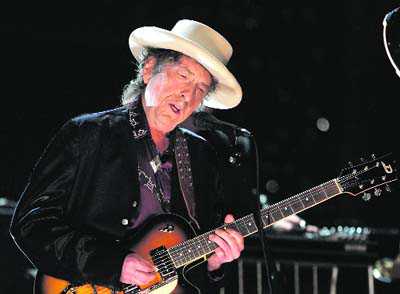Times They Are a-changin: Lyrics are lore of literature
SO, surprisingly, this year’s literature Nobel goes to US singer-songwriter Bob Dylan. Just as Dylan has redefined the boundaries of songwriting in his career spanning half a century and still going strong, the Swedish Academy has taken a dramatic turn by letting lyrics be the lore of literature. This has unleashed notes of discord in the literary world, leading to a tilt in the lilt of men of meters and letters. Specially, of the purist and highbrow variety: they are raising eyebrows (shocked) over Dylan’s selection over acclaimed authors, poets and playwrights.
A highbrow is an intellectual or a person who possesses or has pretensions to superior learning or culture; it also stands for elite. In contrast, a lowbrow work is one that is not complicated and does not demand much intelligence to be understood. And, middlebrow music, literature, art and films are of good quality, interesting and often popular, but can be comprehended easily.
The critics couldn’t care less about considering a composer in a cadence that carries Dylan to the company of such Nobel laureates as TS Eliot, Samuel Beckett, Gabriel García Márquez and Toni Morrison. They declare that Dylan’s poetry without the music lacks depth. His dexterity with words does not dazzle without the strumming of the guitar, say the highbrow, in a bid to browbeat (to intimidate) the lowbrow. But even as the rock star’s selection has rocked many, there are many more who are singing the chorus that has crept out of the Swedish Academy’s tempo of thought.
Justifying the songwriting genre for the prize, Sara Danius of the Academy said: “If you look far back, 5000 years, you discover Homer and Sappho. They wrote poetic texts which were meant to be performed, and it’s the same way for Bob Dylan.” On whether awarding the prize to a musician was a sign of the broadening in the definition of literature, Danius took refuge in Dylan’s line: “The times they are a-changing, perhaps.”
Well, well. The times they are a-changin, indeed. The line between the old categories of highbrow and lowbrow art is blurring. It is evident by the extensive recognition of the iconic Dylan, 75, whose memorable hits are songs packed with imagery redolent of politics, war, social justice, love, religion. There are few who would not have heard his “Blowin’ in the Wind” or “Like a Rolling Stone” or “Knockin’ on Heaven’s Door” or ...well there are umpteen songs. It’s no wonder that his works are a subject of doctoral research in prestigious universities.
And, perhaps, we in India can totally relate to this argument. After all, our rich folklore too has been passed down the ages through the oral medium, in conjunction with music. And, those lyrics and letters are timeless, their profundity and simple truisms lending a resonance to life till date. In our tradition, also is the appreciation of the wisdom and witticisms packed in the musical renditions of ghazals and qawwalis and kavi sammelans. The ecstatic “wah-wahs” of the audience that accompany each line of the poet-singer are de rigueur (required by etiquette) in such melodious gatherings. Such live appreciation is nothing short of a Nobel for the performer at the moment. Notably, equally prevalent are brickbats for a poor show.
In fact, the fact “Gitanjali”, the collection of poems, of our only literature Nobel laureate, Rabindranath Tagore, too has been set to music only adds to the poet’s range and expertise in the field. He was awarded the Nobel in 1913 “because of his profoundly sensitive, fresh and beautiful verse, by which, with consummate skill, he has made his poetic thought, expressed in his own English words, a part of the literature of the West.”
Incidentally, there is one Indian that the Swedish Academy regrets not honouring with an award. He is Mahatma Gandhi. In 2006, the former director of the Nobel Institute, Geir Lundestad, said the greatest omission in the prize's history was never awarding the peace prize to the political activist Mahatma Gandhi. He said that Gandhi was shortlisted five times (twice before World War II, then in 1946, 1947 and 1948), but the committee's Euro-centric viewpoint and its failure to appreciate the struggle for freedom in colonies kept Gandhi from receiving the award.
It has also failed to award several key authors, including James Joyce, Leo Tolstoy, Anton Chekhov, Henrik Ibsen, Mark Twain, George Orwell and Arthur Miller.
Anyway, let’s enjoy a stanza of the latest winner’s “The times they are a-changin”:
Come senators, congressmen
Please heed the call
Don’t stand in the doorway
Don’t block up the hall
For he that gets hurt
Will be he who has stalled
There’s a battle outside
And it is ragin’
It’ll soon shake your windows
And rattle your walls
For the times they are a-changin’.
hkhetal@gmail.com










